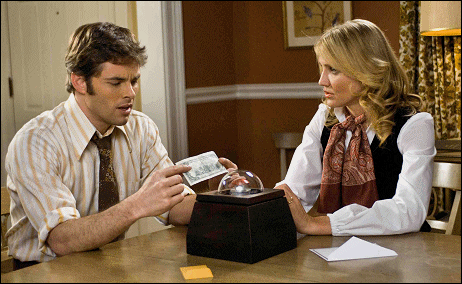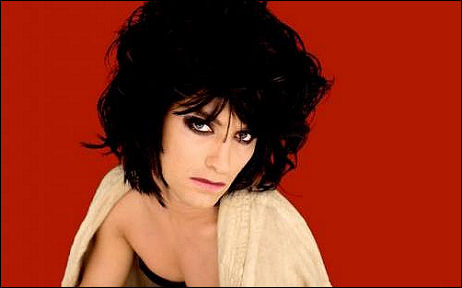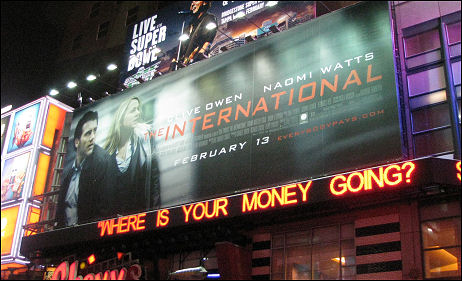Hard times call for harsh measures and a constant eye for bargains. I’m offering one to anyone planning to attend the Cannes Film Festival three months from now, but who lacks an expense account. A well-situated, high-ceilinged studio in Old Town that allegedly sleeps four for 1200 euros — 600 each for two persons, which is how I’d prefer it. Get in touch.
Safe Bet vs. Who Knows?
With this blow-dryer joke, it’s safe to say that Penelope Cruz has the Best Supporting Actress Oscar in the bag. Maybe she already had it and this is icing on the cake. Whatever. I do know that 65-and-over male Academy members (i.e., the Lorenzo Semple, Jr. crowd) have a rep for responding to alluring female contenders. From this point those who haven’t yet voted will be thinking the following about Cruz: (a) great firecracker performance in the Woody Allen film, (b) beautiful, (c) superb in Volver and (b) blowjob joke on Leno. That cinches it.
The question I haven’t settled is whether Kate Winslet will take the Best Actress Oscar for The Reader or if — this is a tangle — uncertainty about what category her Reader performance really and truly belongs in plus Meryl Streep‘s popularity with the acting branch (i.e., that SAG Best Actress award) will upset the apple cart.
WGA Noms
For me, the biggest omission among the WGA nominees for Best Original Screenplay was Martin McDonagh‘s In Bruges — a deliciously offbeat screenplay that wasn’t too dark or comedic, and was genuinely warm and romantic besides.
Due respect to the reservations expressed today by Defamer‘s Kyle Buchanan, but there are simple reasons why Charlie Kaufman‘s Synecdoche and Jenny Lumet‘s Rachel Getting Married were passed over for Best Original Screenplay. One, Synecdoche was overly permeated with Kaufman’s trademark deathhouse gloom and two, Lumet’s screenplay didn’t render enough bombast and sword thrusts in the big-money confrontation scene between Anne Hathaway and Debra Winger. They start to get into the “why did you leave me with him?” issue, Winger freaks and slaps and then Hathaway runs out — not satisfying!
The Best Original Screenplay noms were for Burn After Reading (Joel & Ethan Coen), Milk (Dustin Lance Black), Vicky Cristina Barcelona (Woody Allen), The Visitor (Tom McCarthy) and The Wrestler (Robert Siegel).
Given the general understanding at this stage that The Curious Case of Benjamin Button is basically Forrest Gump with cosmetic/atmospheric changes, I’m a little surprised that screenplay author Eric Roth (and I don’t mean to slight the guy given his bad luck at the hands of Bernard Madoff) was nominated for Best Adapted Screenplay. Adapted from Gump, do they mean?
The other Best Adapted Screenplay nominees are The Dark Knight (Jonathan and Christopher Nolan; story by Christopher Nolan & David S. Goyer), Doubt (John Patrick Shanley), Frost/Nixon (Peter Morgan) and Slumdog Millionaire (Simon Beaufoy).
Repulsion
“How can I explain the feeling of rage that had me white-knuckling my armrest by the end of He’s Just Not That Into You?,” asks N.Y. Observer‘s Sara Vilkomerson. “Unlike the best of romantic comedies — the ones that send you swooning home with thoughts of first kisses and your own private montage of slo-mo paint fights in your first shared apartment, chasing lobsters or dragging a Christmas tree down a West Village cobblestoned street — this movie honestly made me never want to date again. It kind of made me not want to be a woman! Actually, it made me not want to be a member of the human race.”
Worries About The Box
Back in the ’50s or early ’60s a modest-sounding movie like Richard Kelly‘s The Box would have been shot, cut and released within nine to twelve months. Even by today’s dragged-out standards The Box, which shot in the Boston area in December 2007, would have been playing by late October 2008 (i.e., Halloween) or certainly sometime between the spring and summer of ’09. If it’s any kind of commercial draw, I mean.

I say “modest sounding” because The Box is based on a little old Twilight Zone episode called “Button, Button,” which itself was based on a Richard Matheson short story that was written in 1970. It’s not Close Encounters of the Third Kind. It’s just a suburban moral fable that says “don’t be a greedy yuppie.”
Last June, however, Warner Bros. reportedly decided on a release date of 9.11.09. Then on 9.22.08 RichardKelly.net announced that WB “has pushed the release date of The Box back up to 3.20.09.” More recently the studio changed the release date to 11.6.09, which will be nearly two years after the start of principal photography.
Obviously concerns and hesitations are afoot here. Release dates getting shuffled around like this always means something’s amiss. Kelly needed to do something straight and modest after the disaster of Southland Tales, and The Box certainly looked like that — no big deal, open-and-shut thrills, no muss or fuss. I really hope he hasn’t blown it again by getting too ambitious and over-thinking things. Sometimes a thriller needs to just be a thriller the way a cigar needs to just be a cigar.
The movie plot involves a suburban white-bread couple (James Marsden, Cameron Diaz) receiving a strange wooden box from a very creepy older guy (Frank Langella). Press the button on the box, he says, and the owner will receive $1 million, although this act will simultaneously cause the death of another human being somewhere in the world — someone they don’t know.
Button Eyes
Henry Selick‘s Coraline (Focus Features, 2.6), a visually dazzling 3D animated children’s film, is about a young girl who feels bored and listless and neglected by her parents and longs, as many kids do, for a better, more lustrous life. She finds one in a magical fantasy realm that she one day disappears into, Being John Malkovich-style, by crawling through a trap door and then through a long psychedelic tunnel. (But with no mud.)
Sensually delightful and too good to be true at first, Coraline’s fantasy world eventually, of course, turns out to be nightmare. (It reminded me of “A Nice Place to Visit,” a Twilight Zone episode with Larry Blyden as a thief who gets shot and ostensibly goes to heaven — a place filled with riches, girls and endless good times. Which eventually drives him bonkers.) And then she’s trapped there, unable to return to the normal humdrum. And then it’s a mildly scary touch-and-go situation for 15 or 20 minutes.
Based on a respected 2003 children’s book by Neil Gaiman, Coraline is flawless from a technical standpoint. The stop-motion animation, which Selick (The Nightmare Before Christmas) is an obvious master of, is as good as it gets, and the 3D aspects only enhance. It’s first-rate family fare.
But by the standards of me, myself and I, Coraline felt too slow and deliberate. It runs about 95 minutes, give or take, but it would have played better at 70 or 75 minutes. The story is bit too simplistic — Coraline unhappy, finds fantasy realm, delighted with fantasy realm, concerned with fantasy realm, attempts to escape fantasy realm but can’t, finally does. I starting looking at my watch around the 80-minute mark. I was quietly moaning 10 minutes later.
The only thing that kept me going was the creepy notion of all fantasy-realm inhabitants having button eyes, which I took as an analogy for the blotto, disconnected, spaced-out condition of a typical drug user. (You can always tell if someone’s high by their peepers.) You could interpret the basic story, in fact, as a metaphor about a tweener kid falling prey to drug use. Lord knows it happens often enough in real-life suburbia.
The voicings by Dakota Fanning, Teri Hatcher, John Hodgman and Ian McShane are well and good.
Usual Doesn’t Apply
More interesting than Jude Law playing a tranvestite named “Minx” in Sally Potter‘s Rage, which will have its first press screening at the Berlin Film Festival this Sunday, is a post from Potter (appearing on her site) about the unusual cutting style of the film:

“Rage has been a consistent experience at every stage of the working process,” she states. “None of the usual rules seemed to apply. In the cutting room the handheld material (no cut-aways, no reverse angles) dictated a different way of editing. The so-called ‘language’ of film — where and how to cut to create pace and energy — seemed irrelevant, even fake, and was not an option.”
There’s always some kind of curious stylistic scheme going in in a Potter film, isn’t there? Always some kind of high-aesthetic gimmick.
“Similarly, the sound world seemed to reach such degrees of ’emptiness’ in order to feel ‘full’, that we found we had to re-think the process of hearing itself. This is in large part because most of the big events and action in the story happen (audibly) off-screen. In parallel with listening to the character who is talking we have to absorb a lot of activity that is happening out of sight.
“The criteria was to search always for what kept us connected with the core of the material or the character. No empty effects, nothing redundant or gratuitous. It was kind of exhilarating to not be able to take anything for granted.”
As for Law’s character and the general subject matter:
“Part of the subject matter of Rage is the ugly use of beauty in the pursuit of profit,” Potter writes. “Drugged by marketing, sapped by fear of aging, conned by the cult of celebrity — image becomes all.”
“Law, whose beauty has sometimes been held against him as an actor, made the courageous decision to accept the role of Minx — a ‘celebrity super-model’ — and took on a kind of hyper-beauty for this persona…a ‘female’ beauty which gradually unravels as the story unfolds. Strangely, the more he became a ‘she’, coiffed and made-up, the more naked was his performance. There was great strength in his willingness to make himself vulnerable. It was an extraordinarily intense part of the shoot.”
http://www.berlinale.de/en/presse/pressevorfuehrungen/datenblatt.php?film_id=20091073
Timing
The thrust of this 2.3 L.A. Times Claudia Eller piece is that the current economic calamity makes the 2.13 release Confessions of a Shopaholic, a comedy about overspending and subsequent debt, seem almost absurdly unappealing.
Eller runs optimistic, damn-the-torpedos quotes from Shopaholic producer Jerry Bruckheimer and Disney marketing chief Jim Gallagher. But the quote that sticks is from USC entertainment business instructor Mark Young, to wit: “If you just lost your home and can’t pay your bills, the last thing you want to see is someone representing greed and excess.”
I ran a short quoteless riff on this same idea last January 8th.




